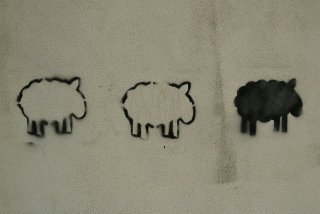
Baa, baa, black sheep,
Have you any wool?
Yes sir, yes sir,
Three bags full.
One for the master,
One for the dame,
And one for the little boy
Who lives down the lane.
The children's rhyme "Baa Baa Black Sheep" traces its origns to the Middle Ages, and relates to a tax imposed on English wool. One-third went to the local lord (the "master"), one-third to the church (referred to as the "dame") and one-third to the farmer (the "little boy who lives down the lane"). In modern speech, "black sheep" is an idiom for an outsider separated by choice or circumstance from the otherwise ubiqutious norms and/or opinions of the surrounding "flock."

2 comments:
I count black sheep to go to bed at night. I am the black sheep in my family. What's that all about? Why are black sheep of the family drawn together?
Another interesting tidbit about "black sheep" is that, while they occur naturally, their wool is less desireable since it cannot be dyed (i.e., it cannot be changed to suit the preferences of another).
Post a Comment